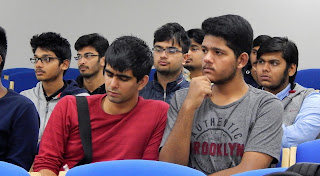-Report by Aujas Sohal
-Photographs by Abhishek Sharma
After a quick introduction by a fellow sophian, Anthony sir
began his lecture with a French quote, the heart has reason which the reason
does not know, as always drawing everybody’s attention with a single line. Sir
started the lecture with a note of thanks to everybody who had welcomed him and
made this occasion possible.
There is an increasing
realization that today’s dominant scientific cosmology is just one particular Cosmo
vision that puts the emphasis on a quantifiable vision within a mechanical
conception of the universe.
We know, however, that
not all epistemology is “scientific”; not all cognition is measurable; not all
knowledge is covered by “Science.”
Modern Science cannot be said to know the world or to have penetrated
the nature of Reality. Though it is
through the techno-science, the economic and other developments and expansion
have come about in the western societies, yet modern-day western scientific
culture is not the only scientific culture possible even in the West.
Furthermore, its
suppositions are neither neutral nor universal and they do not fully represent
or exhaust the universal range of human experience. Each culture has its own
sense of the cosmos and the cosmos speaks differently to different cultures.
This brings to awareness the contemporary experience of the “conflict of
cosmologies.”
It is in this context,
the speaker introduced the intercultural philosopher Raimon Panikkar’s new
“Kosmology” (with K, not C). Kosmology
is the disclosure and holistic sense of the kosmos by means of all forms of knowledge
we possess. It indeed invites us to experience the universe not as a mechanical
or sophisticated organization, but as a living organism which requires a
holistic and creative participation, assisted by an intercultural vision and
collaboration.
The cosmological vision which we follow to date, has proven
to be very important and of an exquisite nature, too important to remove from
our lives. Dependence on old traditions is important but it needs to go hand in
hand with the current modern world. There have been many signs of a new
cosmological view that is taking form in the eyes of people. Religion is becoming
a meaningless hypothesis, because it is unable to adapt to the secular issues
that are present today. This calls in for a new view, a view of a mixture of
technology and art, a technicultural view.
Techniculture is that dimension which ties us with the
beautiful things around us and adapts itself according to the modern culture.
‘Nature is written in a mathematical language’ a quote given in regard to
nature indicating that everything around us can be discovered and all the
riddles found solved like any mathematical problem.
 Signs of the new kosmology are many and can be easily found if
we look carefully around ourselves; celebration of the body, ability to read
the sacred in the secular, worshipping work, individualism, human unity and
solidarity, realization that every word in religion arises from the secular and
realizing that the world, the God, the man are not three separate realities but
are one and are dependent on each other. Seeing all these amazing changes we
realize that the entire world is becoming a place for our salvation.
Signs of the new kosmology are many and can be easily found if
we look carefully around ourselves; celebration of the body, ability to read
the sacred in the secular, worshipping work, individualism, human unity and
solidarity, realization that every word in religion arises from the secular and
realizing that the world, the God, the man are not three separate realities but
are one and are dependent on each other. Seeing all these amazing changes we
realize that the entire world is becoming a place for our salvation.
After an amazing lecture which would require even the best of
us to open dictionaries again, there was a short Q & A session. Then the vice
president of Sophia Club, Sadvansha Munshi gave the vote of thanks and brought
the wonderful evening to its conclusion.
All of us learnt new things, things that were around us the
entire time and theories that would bogle our minds the entire night. We went
back wishing that every evening would be as enlightening as this.




























